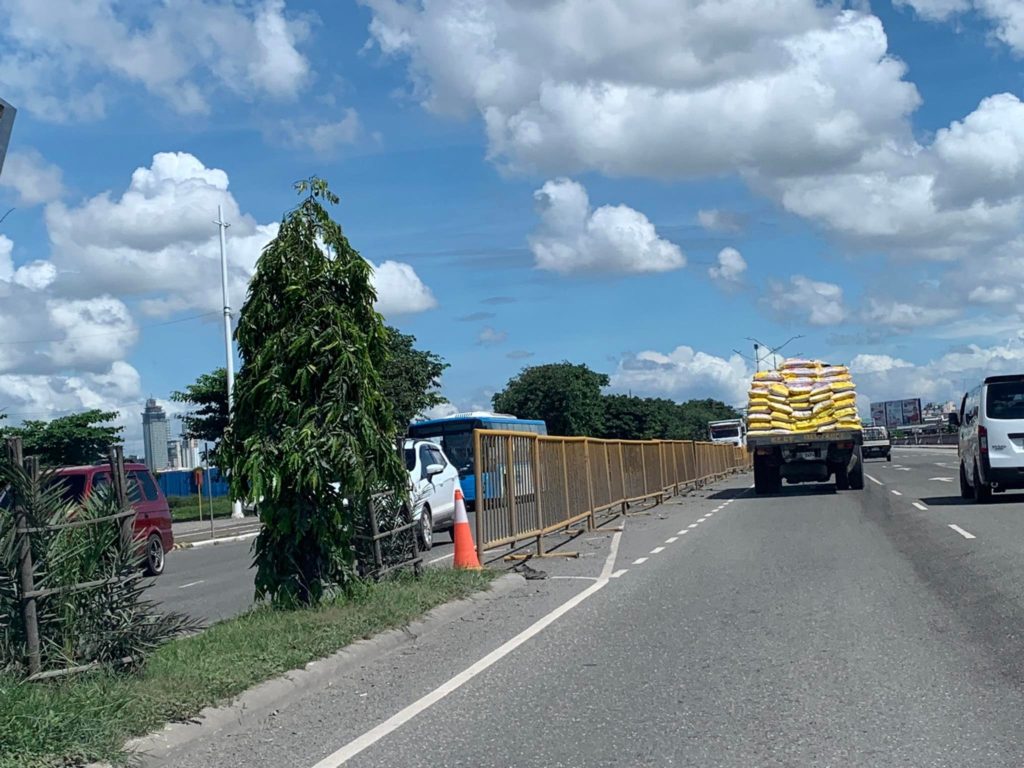Will CCTO remove the yellow railings at the CSCR-F. Vestil junction too?

Yellow railings are found in the middle at the Cebu South Coastal Road. | Delta Dyrecka Letigio
CEBU CITY, Philippines — The Cebu City Transportation Office (CCTO) has started to remove yellow railings that were placed in the middle in some city streets in accordance with the directive of acting Mayor Michael Rama to rid roads here of all forms of obstructions.
And they are now looking at the possibility of also removing the yellow railings that are now found at the Cebu South Coastal Road (CSCR), especially the junction of CSCR and F. Vestil Street, says Paul Gotiong, the CCTO spokesperson.
However, Gotioing said, the removal of yellow railings at the CSCR do not necessarily mean that u-turns will again be allowed at the junction.
Even in the absence of the yellow railings, motorists will still be asked to make a u-turn at designated slots that are located 3.4 kilometers apart.
The CSCR’s northbound u-turn slot is located under the bridge at the South Road Properties (SRP) while the southbound u-turn slot is located close to the on and off-ramp of the Cebu Cordova Link Expressway (CCLEX).
Earlier, Rama said, he wanted all mid-road yellow railings that are now being used as center islands removed because its presence could result to accidents.
READ: Rama wants mid-road railings, posters, tarps removed
Gotiong said they are currently studying means on how to go about the mayor’s directive. Their study will include looking into the possibility of eventually reopening the junction of the CSCR and F. Vestil Street in the future.
One of the longest yellow railings in the city is found at the SRP.
The railings at the junction of the CSCR and F. Vestil Street were placed there to prevent traffic gridlock in the area.
The junction has been closed for nearly two years now since the CCLEX construction began. In certain instances that would warrant the closure of the CSCR’s viaduct, the yellow railings are removed to allow the implementation of rerouting schemes in the area.
Gotiong said that while they may soon remove the yellow railings at the junction of CSCR and F. Vestil Street, the area will remain close to vehicle traffic.
And to make sure that motorists will not attempt to make a u-turn there, CCTO personnel will be deployed in the area 24/7.
“Kana siya, i-out pud na siya, pero nagwait ta sa orders gyod. Ang plano man gyod is ipa-open up na nga junction pero gistudy pa na siya karon before nato mafinalize. It needs nga 24/7 nga manning. Hopefully, mapangitaan og paagi,” he said.
(The railings will have to be removed soon but we are still waiting for a formal order on that. Our plan is to eventually open the junction but we are still studying the matter before this can be finalized. This will require the deployment of personnel in the area 24/7. Hopefully, we will be able to find means on how to do this.)
At the same time, Gotiong said, they are also studying the possible removal of the yellow railings at the Banilad road.
Gotiong admits that the installation of yellow railings in the middle of the city roads has its pros and cons and they wanted to consider all these while they also weigh their options on how to properly manage traffic flow in these areas.
He said that removal of yellow railings will facilitate the easy access to vehicles in case of emergencies but at the same time this will also encourage motorists to make an immediate u-turn and commit other traffic violations and pedestrians to just cross the streets anytime.
“Mao na among iremind atong mga motorists, bawal gyod magovertake labi na og double yellow line ang marking. Madakpan gyod sila,” said Gotiong.
(That is why it is important to always remind motorists that they cannot just overtake especially when there is a double yellow line marking. They will surely be arrested.
Gotiong said there is always a need to balance the removal of the yellow railings with the need to ensure discipline among motorists and the pedestrians. / dcb
Disclaimer: The comments uploaded on this site do not necessarily represent or reflect the views of management and owner of Cebudailynews. We reserve the right to exclude comments that we deem to be inconsistent with our editorial standards.
